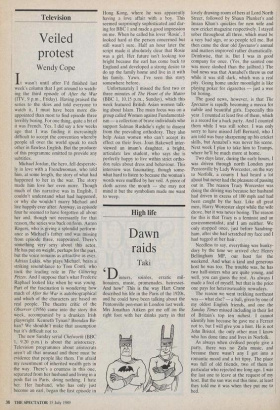Television
Veiled protest
Wendy Cope
It wasn't until after I'd finished last week's column that I got around to watch- ing the third episode of After the War (ITV, 9 p.m., Friday). Having praised the series to the skies and told everyone to watch it, I must have been more dis- appointed than most to find episode three terribly boring. For one thing, quite a bit of it was French. Yes, I did say a few weeks ago that I was finding it increasingly difficult to accept the convention whereby people all over the world speak to each other in flawless English. But the producer of this programme omitted to provide any subtitles.
Michael Jordan, the hero, fell desperate- ly in love with a Frenchwoman, who told him, at some length, the story of what had happened to her in the war. The story made him love her even more. Though much of this narrative was in English, I couldn't understand what had happened, or why she wouldn't marry Michael and live happily ever after. Anyway, in episode four he seemed to have forgotten all about her and, though not necessarily for that reason, the series was back on form. Anton Rogers, who is giving a splendid perform- ance as Michael's father and was missing from episode three, reappeared. There's something very sexy about this actor. He has put on weight, perhaps for the part, but the voice remains as attractive as ever. Adrian Lukis, who plays Michael, bears a striking resemblance to Tom Conti, who took the leading role in The Glittering Prizes. And I suppose that's what Frederic Raphael looked like when he was young. Part of the fascination is wondering how much of After the War is autobiographical and which of the characters are based on real people. • The theatre critic of the Observer (1956) came into the story this week, accompanied by a drunken Irish playwright. Kenneth Tynan? Brendan Be- han? We shouldn't make that assumption but it's difficult not to.
The new Sunday serial Chelworth (BBC 1, 9.20 p.m.) is about the aristocracy. Television programmes about aristocrats aren't all that unusual and there must be evidence that people like them. I'm afraid my resentment of inherited wealth gets in the way. There's a countess in this one, separated from her husband and living in a posh flat in Paris, doing nothing. I hate her. Her husband, who has only just become an earl, began the first episode in Hong Kong, where he was apparently having a love affair with a boy. This seemed surprisingly sophisticated and dar- ing for BBC 1 and made a good impression on me. When he called his lover 'Rosie', I looked hard at the person concerned but still wasn't sure. Half an hour later the script made it absolutely clear that Rosie was a girl. Her future isn't looking too bright because the earl has come back to England and developed a strong desire to do up the family home and live in it, with his family. Yawn. I've seen this story somewhere before.
Unfortunately I missed the first two or three minutes of The Heart of the Matter (BBC 1, 10.15 p.m., Sunday), which this week featured British Asian women talk- ing about Islam. The main focus was on a group called Women against Fundamental- ism — a collection of brave individuals who support Salman Rushdie's right to dissent from the prevailing orthodoxy. They also help Asian women who can't accept its effect on their lives. Joan Bakewell inter- viewed an imam's daughter, a bright, articulate law student, who says she is perfectly happy to live within strict ortho- dox rules about dress and behaviour. This interview was fascinating, though some- what hard to listen to because the woman's words were muffled by her veil. A piece of cloth across the mouth — she may not mind it but the symbolism made me want to weep.


















































 Previous page
Previous page